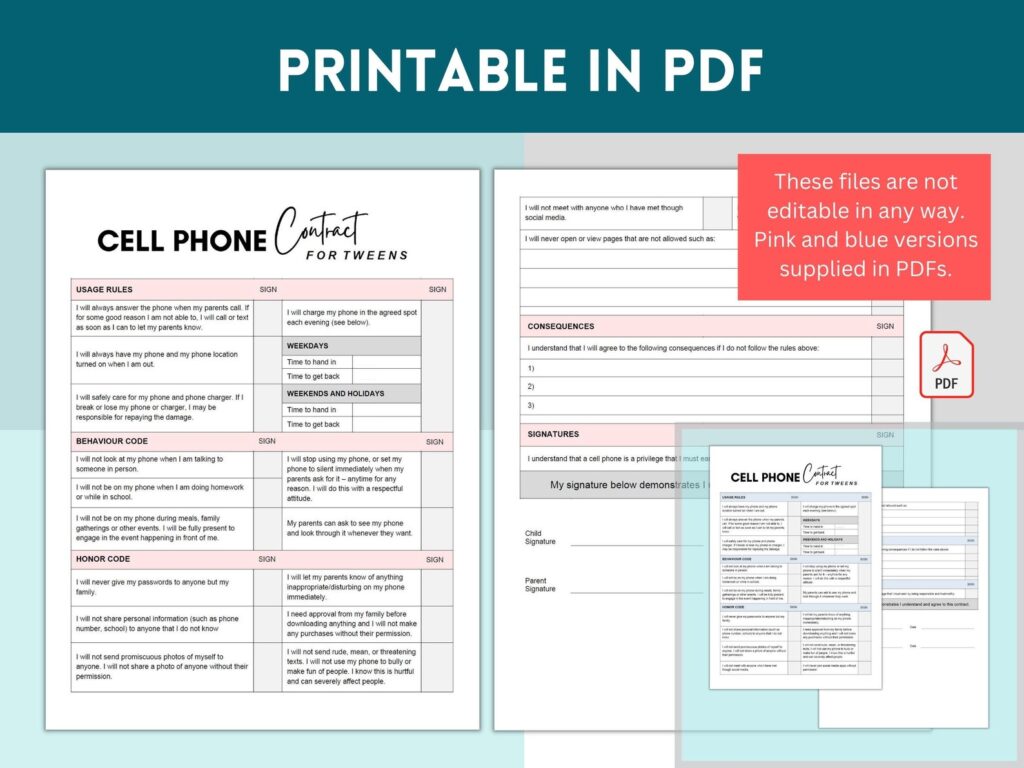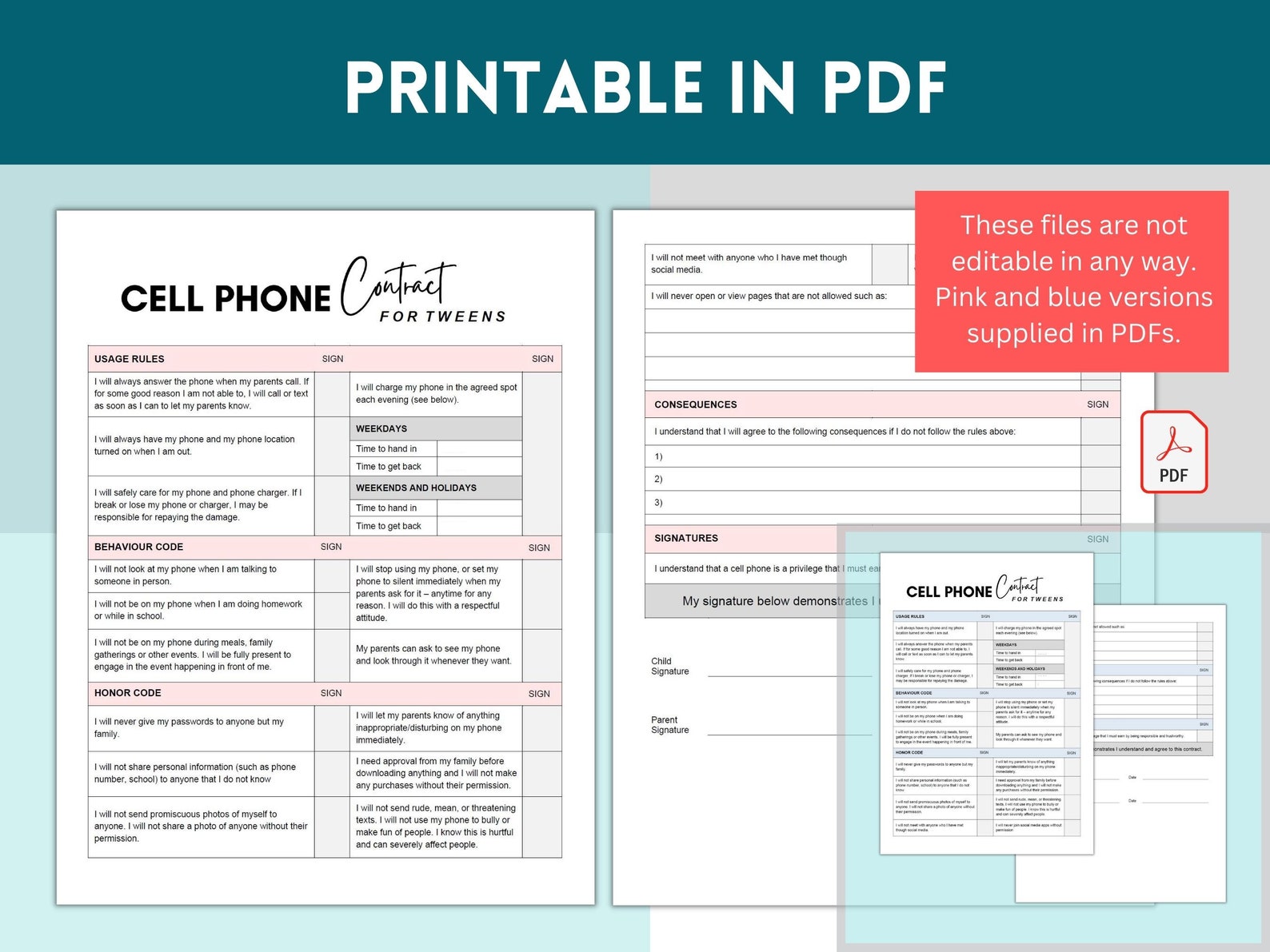
Navigating the Digital Landscape: Crafting a Cell Phone Agreement for Teenagers
In today’s hyper-connected world, cell phones are no longer a luxury but a near necessity. For teenagers, in particular, these devices are crucial tools for communication, education, and social interaction. However, the ease and accessibility of cell phones can also lead to misuse, over-reliance, and potential dangers. This is where a well-crafted cell phone agreement becomes invaluable. A cell phone agreement, when thoughtfully put together, outlines expectations, responsibilities, and consequences related to phone usage. It’s more than just a list of rules; it’s a framework for fostering responsible digital citizenship and open communication between parents and their teens.
This article delves into the importance of a cell phone agreement for teenagers, providing a comprehensive guide on how to create one that is both effective and adaptable. We’ll explore the key components that should be included, the benefits of having such an agreement in place, and tips for ensuring that it remains a relevant and useful tool as your teenager grows and their cell phone usage evolves.
Why a Cell Phone Agreement Matters
Before diving into the specifics of creating a cell phone agreement, let’s understand why it’s so important. The digital world presents unique challenges for teenagers, who are still developing their decision-making skills and impulse control. Without clear guidelines, they may be more susceptible to cyberbullying, online predators, inappropriate content, and addiction. A cell phone agreement helps mitigate these risks by setting boundaries and promoting responsible behavior.
- Sets Clear Expectations: A cell phone agreement clearly defines what is expected of your teenager in terms of phone usage. This includes things like appropriate content, screen time limits, and online safety.
- Promotes Responsible Behavior: By outlining the consequences of misuse, a cell phone agreement encourages teenagers to make responsible choices when using their phones.
- Enhances Communication: The process of creating a cell phone agreement provides an opportunity for open and honest communication between parents and their teens about the challenges and responsibilities of cell phone ownership.
- Mitigates Risks: A cell phone agreement can help protect teenagers from the potential dangers of the digital world, such as cyberbullying, online predators, and inappropriate content.
- Teaches Digital Citizenship: A cell phone agreement instills the values of digital citizenship, such as respecting others online, protecting privacy, and using technology responsibly.
Key Components of a Cell Phone Agreement
A comprehensive cell phone agreement should address several key areas of cell phone usage. Here’s a breakdown of the essential components to include:
Usage Guidelines
This section outlines the specific rules and expectations for cell phone usage. Consider including the following:
- Screen Time Limits: Define how much time your teenager can spend on their phone each day or week. Consider different limits for weekdays and weekends.
- Restricted Times: Specify times when cell phone usage is prohibited, such as during school hours, mealtimes, and bedtime.
- Location Restrictions: Identify places where cell phone usage is not allowed, such as during family gatherings, religious services, or at the dinner table.
- App Usage: Specify which apps are allowed and which are prohibited. Consider parental control apps to monitor usage and block inappropriate content.
- Data Usage: Set limits on data usage to avoid exceeding your monthly plan. Discuss the costs associated with exceeding the limit and who will be responsible for paying them.
Online Safety
This section focuses on protecting your teenager from the potential dangers of the online world. Consider including the following:
- Cyberbullying: Define what constitutes cyberbullying and make it clear that it will not be tolerated. Discuss the importance of reporting cyberbullying incidents and providing support to victims.
- Online Predators: Educate your teenager about the dangers of online predators and the importance of never sharing personal information with strangers.
- Inappropriate Content: Discuss the types of content that are considered inappropriate, such as pornography, violence, and hate speech. Explain the potential consequences of viewing or sharing such content.
- Privacy Settings: Review the privacy settings on your teenager’s social media accounts and ensure that they are set to the most restrictive levels.
- Password Security: Emphasize the importance of creating strong passwords and keeping them confidential.
Respect and Responsibility
This section focuses on promoting responsible and respectful behavior when using a cell phone. Consider including the following:
- Respect for Others: Emphasize the importance of treating others with respect online and avoiding hurtful or offensive language.
- Privacy of Others: Explain the importance of respecting the privacy of others and not sharing their personal information without their consent.
- Digital Footprint: Discuss the concept of a digital footprint and the importance of being mindful of the content they post online.
- Responsible Communication: Encourage your teenager to communicate responsibly and avoid spreading rumors or gossip.
- Respecting School Rules: Remind your teenager of the school’s rules regarding cell phone usage and the consequences of violating them.
Consequences
This section outlines the consequences of violating the cell phone agreement. It’s important to be clear and consistent in enforcing these consequences. Consider including the following:
- Warning: A verbal or written warning for minor infractions.
- Loss of Privileges: Temporary suspension of cell phone privileges for more serious violations.
- Financial Responsibility: Requiring your teenager to pay for damages or overage fees caused by their misuse of the phone.
- Contract Termination: Permanent revocation of cell phone privileges for repeated or egregious violations.
Crafting the Agreement: A Step-by-Step Guide
Creating a cell phone agreement doesn’t have to be a daunting task. Here’s a step-by-step guide to help you get started:
- Have an Open Conversation: Start by having an open and honest conversation with your teenager about the benefits and responsibilities of cell phone ownership. Ask for their input and listen to their concerns.
- Research and Customize: Use online resources and templates to get ideas for your cell phone agreement. Customize the agreement to fit your family’s specific needs and values.
- Keep it Simple and Clear: Use clear and concise language that your teenager can easily understand. Avoid jargon or legal terms.
- Make it a Collaborative Effort: Involve your teenager in the drafting process to ensure that they feel ownership of the agreement.
- Review and Revise Regularly: As your teenager grows and their cell phone usage evolves, review and revise the agreement to ensure that it remains relevant and effective.
- Sign and Date the Agreement: Once you and your teenager are satisfied with the agreement, sign and date it to signify your commitment to upholding its terms.
Tips for Success
Here are some additional tips for ensuring that your cell phone agreement is a success:
- Be Consistent: Enforce the consequences consistently and fairly. This will help your teenager understand that you are serious about the agreement.
- Lead by Example: Model responsible cell phone behavior yourself. This includes limiting your own screen time, avoiding phone usage while driving, and respecting others’ privacy.
- Stay Informed: Keep up-to-date on the latest trends and risks in the digital world. This will help you have informed conversations with your teenager about online safety.
- Be Flexible: Be willing to adjust the agreement as needed to accommodate your teenager’s changing needs and circumstances.
- Focus on Communication: Use the cell phone agreement as an opportunity to build a strong and trusting relationship with your teenager.
The Evolving Landscape of Cell Phone Agreements
The world of technology is constantly evolving, and so too should your cell phone agreement. What worked last year might not be relevant today. New apps emerge, social media trends shift, and your teenager’s maturity level changes. Regular review and adaptation are crucial.
Consider adding clauses that address emerging concerns like deepfakes, misinformation, and the ethical implications of AI-powered apps. Discuss the importance of critical thinking and media literacy in navigating the digital landscape. Encourage your teenager to be a responsible digital citizen who contributes positively to the online community.
Beyond the Agreement: Fostering Digital Wellness
A cell phone agreement is a valuable tool, but it’s not a substitute for ongoing communication and education. It’s essential to foster a culture of digital wellness in your family, where technology is used responsibly and mindfully. Encourage your teenager to engage in offline activities, pursue their passions, and connect with others in meaningful ways.
Promote healthy habits like taking regular breaks from screens, getting enough sleep, and spending time outdoors. Help your teenager develop a balanced lifestyle that integrates technology seamlessly without allowing it to dominate their lives. [See also: Digital Detox for Teens: Reclaiming Real Life]
Conclusion: Empowering Teenagers for a Digital Future
A well-crafted cell phone agreement is an investment in your teenager’s future. It provides a framework for responsible digital citizenship, promotes open communication, and mitigates the risks associated with cell phone usage. By setting clear expectations, enforcing consequences, and fostering a culture of digital wellness, you can empower your teenager to navigate the digital landscape safely and successfully. Remember that the goal is not to restrict their access to technology but to equip them with the knowledge and skills they need to thrive in a hyper-connected world. This cell phone agreement is a living document, adapting with the times and the growth of your teenager, ensuring they are prepared for the digital future ahead, with a cell phone agreement that supports their responsible use.

